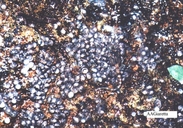|
Distribution and Habitat
Country distribution from AmphibiaWeb's database: Brazil
Known from Serra do Mar and the coastal forests in eastern São Paulo state, Brazil.Trends and Threats
Toledo et al (2023) included this species in their review of the Brazilian Atlantic Forest amphibian declines (see Supplemental). Comments
This species was featured as News of the Week on 14 December 2020:
Animals have many mating systems ranging from polygamy of one or both sexes to monogamy. Until recently polygyny, involving a male with several females with mate fidelity, had not been observed in amphibians. New observations from de Sá et al. (2020) change that with their description of how Thoropa taophora males guard rare breeding sites in rock seeps over an extended period of time where they exclusively breed multiple times with two or more females. Adding to the complexity of this breeding system, females appear to display a hierarchy with the dominant female mating more often and laying more eggs in the breeding site. The authors hypothesize that the same causes of polygyny in other systems, the severe limiting of breeding sites and intense intrasexual competition for mates, accounts for the development of this mating system in Thoropa taophora (Written by Ann T. Chang)
This species was featured as News of the Week on 13 March 2023:
Brazil is considered a mega-diverse country for amphibian diversity (1159 amphibian species known so far). However, it is also home to one of the global hotspots of amphibian decline, the coastal Atlantic Forest. To understand the history, nature, and response of species to the precipitous declines, Toledo and colleagues (2023) closely analysed surveys, reports, and museum records with environmental, climatic, and disease data. Their study more than doubled the number of population declines reported in previous studies, placing the Brazilian Atlantic Forest as a global hotspot of amphibian declines with one of the highest rates of declines and extinctions. The height of decline appears to be in 1979 within a decades long trend. Populations, if they recovered, sometimes took as long as 30 or more years. Their use of museum collections showed that specimen records matched the spatiotemporal patterns of declines and extinctions, including the impact of chytridiomycoses; they suspect that historic declines might have impacted many more amphibian populations and species. They also sought correlations of life history traits and phylogeny to help explore patterns of decline. They note some families were disproportionally impacted by declines (specifically Cycloramphidae, Hylodidae, Phyllomedusidae). Their comprehensive report will be an essential guide to conservation, management, and disease surveillance to protect this important amphibian ecology. (Written by Michelle S. Koo)
References
Toledo LF, de Carvalho-e-Silva, SP, de Carvalho-e-Silva AMPT, Gasparini, JL, Baêta D, Rebouças R, Haddad CFB, Becker CG & Carvalho T (2023). "A retrospective overview of amphibian declines in Brazil's Atlantic Forest." Biological Conservation, 277, [109845]. [link]
Edited by: Michelle S. Koo (2023-03-12)Species Account Citation: AmphibiaWeb 2023 Thoropa taophora <https://amphibiaweb.org/species/7305> University of California, Berkeley, CA, USA. Accessed Nov 12, 2024.
Feedback or comments about this page.
Citation: AmphibiaWeb. 2024. <https://amphibiaweb.org> University of California, Berkeley, CA, USA. Accessed 12 Nov 2024.
AmphibiaWeb's policy on data use.
|





 Map of Life
Map of Life